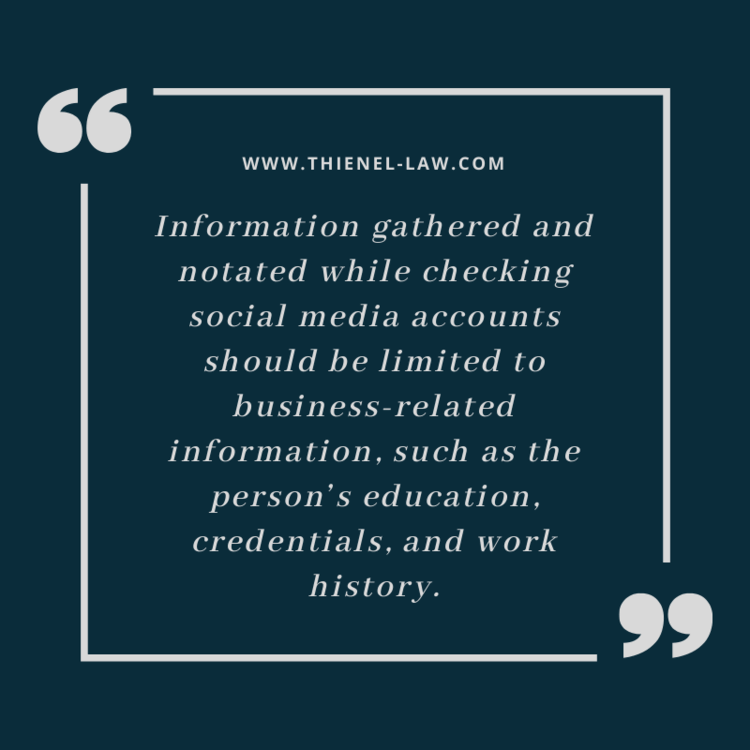The Do's and Don’ts of Using Social Media to Vet Prospective Employees
Social media is a daily part of the lives of many individuals. Often, an individual’s entire social, work, and family life can be found on their social media feeds and profiles. As an employer, social media accounts can be a great way to vet and research prospective employees. However, employers who research social media accounts as part of their screening process and background search for job applicants can also run into several problems.
An employer could violate a person’s legal rights by including social media accounts in a background search without obtaining permission from the applicant.
A Maryland business attorney can review your employee screening process to determine if you are potentially violating the legal rights of potential employees. An attorney can also help you develop a screening process and background search that might include social media accounts while protecting you, your company, and your employees from potential lawsuits and liability for violating employment and privacy laws.
Five Do’s and Don’ts for Using Social Media During the Employee Screening Process
1. DON’T Forget To Obtain Written Acknowledgements From Applicants
Before accessing any social media accounts, it is prudent to obtain written acknowledgment from the applicant that your company routinely screens social media accounts as part of the employee background check. The acknowledgment can contain a consent by the applicant for your company to access any public social media accounts for business-related purposes only. Of course, this acknowledgment typically motivates applicants to “clean up” their social media accounts or increase the security settings on the accounts, but you don’t want to risk liability for violating rights by failing to obtain consent or provide notice of intent.
2. DON’T Use Personal Information That Violates Federal Anti-Discrimination Laws
Using certain information found in an applicant’s social media accounts as the sole basis for your hiring decision could violate federal employment laws.
For instance, basing your hiring decision solely on a person’s race, religion, age, color, or national origin violates Title VII of the Civil Rights Act of 1964. Using a person’s age could violate The Age Discrimination in Employment Act of 1967. If you discover an applicant has a disability, using that information as the sole basis for a hiring decision could violate The Americans with Disabilities Act of 1990.
“Using certain information found in an applicant’s social media accounts as the sole basis for your hiring decision could violate federal employment laws. ”
— Steve Thienel
You can avoid the appearance of using personal information discovered by searching social media as the sole reason for a hiring decision by waiting until after you interview an applicant to conduct an internet and social media search.
3. DO Document Everything And Keep Detailed Records
Another way to avoid the appearance of using social media or personal information as the sole basis for hiring decisions is to keep detailed records. Keep records that reflect each account or profile accessed, the date and time the information was viewed, and the information collected from the account.
Don’t include personal information viewed on social media accounts in the records. Information gathered and notated while checking social media accounts should be limited to business-related information, such as the person’s education, credentials, and work history.
Also, keep detailed notes in the records regarding all other vetting processes, such as the personal interview, credit checks, criminal background checks, references, and other information that proves you did not make your decision to hire this person based solely on personal information found online through social media accounts.
4. DO Institute A Strict Policy For Social Media Screening
Consistency is the key for employers who use social media screening during the employee vetting process. Developing a policy that contains guidelines for conducting social media screenings, who has access to the information, and the information gathered can also protect employers from liability.
The key is to develop a policy that protects the employer from allegations of discrimination and violating a person’s right to privacy. Policies that require social media screenings to be performed at the same phase during the hiring process and require the same social media accounts to be checked for each applicant help to reduce the risk of liability for employers.
5. DO Use An Outside Service To Perform Searches
If you want to screen social media accounts as part of the background check for potential employees, using an outside service may be the best way to protect your company. No one in your company will have access to personal information on social media accounts, which limits your liability. However, if you hire a company to perform background checks, choose a company with a good reputation and provides proof it complies with all federal and state privacy and employment laws, including the Fair Credit Reporting Act.
“If you hire a company to perform background checks, choose a company with a good reputation and provides proof it complies with all federal and state privacy and employment laws, including the Fair Credit Reporting Act.”
— Steve Thienel
Contact a Maryland Business Attorney for More Information
Employment-related matters can be frustrating, time-consuming, and costly. A Maryland business attorney can help you develop procedures, guidelines, and forms that help reduce the risk of legal problems and disputes. Contact Thienel Law today. Maryland business attorney Steve Thienel is dedicated to assisting clients in Maryland, Virginia, and throughout the DC Metro area.



